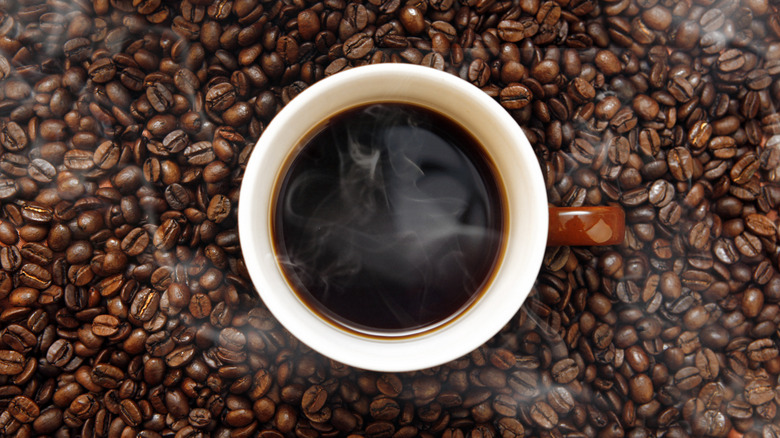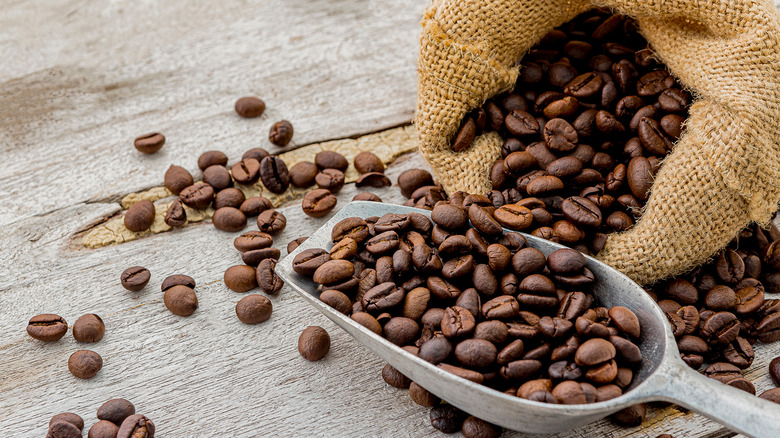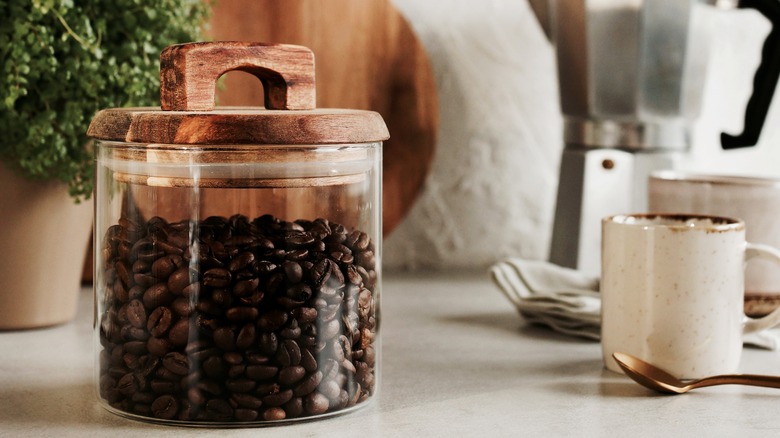Is It Safe To Brew Coffee With Old Beans?
It is pretty easy to tell when most food items have gone bad. Slimy spinach, sour milk, and moldy bread have all pretty clearly passed their expiration date. However, other items in your kitchen might not be so obvious. After all, some foods, such as canned goods and condiments, have a very long shelf life, while other items in your pantry, like honey, actually never go bad. But when you are poking around your cupboards, it can sometimes be hard to tell exactly how long some items can really last.
Coffee, for example, is the most popular beverage in the world with over 450 million cups being drunk every single day just in America alone, according to How Stuff Works. But just how well do you know your coffee beans? Whether you like to stockpile your favorite brands from Costco, or only brew a mug of Joe once a week, you probably have some coffee that has been sitting in your cabinet for a while. But is that old container of coffee beans safe to use?
Coffee beans don't spoil
It turns out, the answer is yes, but with a few caveats. Coffee beans don't really expire, as something like milk would. However, that doesn't mean they don't lose quality as time passes. They won't rot or grow mold, but old beans will lose flavor and develop a stale, weak taste over time (per PureWow). So while brewing coffee with old beans is unlikely to make you sick, it won't exactly make a great cup of coffee either.
However, once the beans have come into contact with moisture, whether through brewing or through overexposure to moisture by other means, they can grow rancid. Coffee beans also tend to have a longer life than ground coffee, so for optimal freshness, it's advisable to only ground the amount of coffee that you plan on consuming that same day. This is because once coffee beans are ground, a greater amount of the coffee's surface area is exposed to elements, such as heat, light, and air, that can cause the oils in the coffee to evaporate and thus lose its strength and flavor, according to Does It Go Bad. The same rule applies to ground coffee as it does to coffee beans — ground coffee doesn't spoil, per se, but it does lose its flavor and decline in quality at a quicker rate than whole beans.
Coffee should be stored properly to retain freshness
As with most foods, storage is key when it comes to extending the shelf life of the product. Coffee beans and ground coffee should be stored in a sealed, airtight container in a cool, dark place, such as a cabinet or cupboard, according to Atlas Coffee Club. Coffee is sensitive to light, oxygen, moisture, and extreme temperatures, so it is best kept in a cool cupboard, in an opaque container that does not allow exposure to direct light. Heat and humidity can cause the beans to break down and lose flavor, so the more temperature stable the storage environment is, the longer the quality of the coffee will last.
In general, a sealed, unopened container of coffee beans can last for up to six months before they begin to decline in quality and taste, while ground coffee retains its flavor and freshness for about three to five months when stored properly, according to Street Smart Kitchen. As for coffee that is already brewed, it will keep for a few days if stored in the refrigerator. However, brewed coffee can absolutely go rancid and stale within a few hours if left out in the open, so if your coffee has been sitting out for a while, it is probably best to brew a fresh pot.


